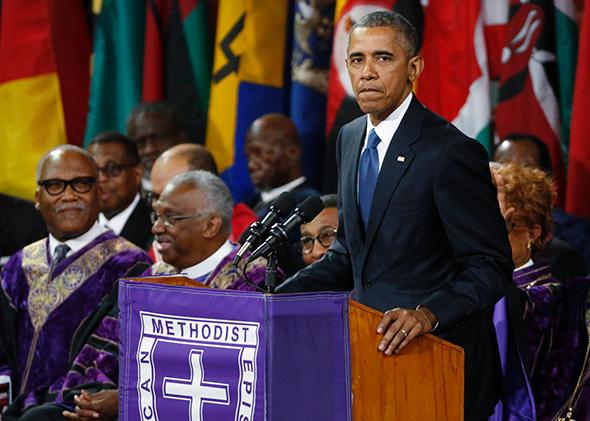On Friday, as much of the country rejoiced at the Supreme Court’s ruling on same-sex marriage, and Charleston, South Carolina, continued to mourn its dead, President Obama delivered what may go down as his most impassioned, biting, and unambiguous statement on race since being elected into office.
This statement was, unfortunately, delivered by way of a eulogy for the Rev. Clementa Pinckney, the South Carolina state senator and reverend who was murdered last week, along with eight others, at Emanuel African Methodist Episcopal Church by Dylann Roof, a white supremacist. But what started out as a moving celebration of the life of Pinckney (“Preacher by 13. Pastor by 18. Public servant by 23—what a life [he] lived.”) soon morphed into a rousing, mesmerizing political sermon, one in which Obama tackled pretty much all of the controversial angles that have intersected in the aftermath of the Charleston massacre: the confederate flag. Gun control. Systemic racism.
Obama was in the zone. Bit by bit, he unfurled the long strands of history—“bombs, arson, shots fired at churches, not random, but as a means to control”—that have, in their own ways, led to the shooting: “[Roof] sensed the meaning of his violent act,” he said, emphatically. He spoke, in the eloquent and fervent nature of a preacher, about the emotional and symbolic resistance of the past week, even as families and friends of the deceased grieve. Roof couldn’t fathom “how the United States of America would respond not merely with repulsion at this act, but with generosity and more importantly, with a thoughtful introspection and self-examination that we so rarely see in the public eye.” He called out the Confederate flag for what it truly is, “a reminder of systemic oppression and racial subjugation.” He alluded to the Newtown, Connecticut, and the Colorado movie theater shootings, and reminded us of the “30 precious lives cut short by gun violence in this country every day.” But most astounding was the way he talked about the less obvious, more pervasive aspects of racism in this country.
“Maybe we now realize the way a racial bias can infect us even when we don’t realize,” he said. “So that we are guarding against not racial slurs but also going against the subtle impulse to call Johnny back for a job interview but not Jamal. So that we search our hearts when we consider laws to make it harder for some of our fellow citizens to vote.”
As president, Obama has never been so frank when talking about race. In the wake of Trayvon Martin’s death, he tiptoed—the catchy sound bite “If I had a son, he’d look like Trayvon” was nice, but it was the only quote worth repeating from that statement. He was similarly careful and ambiguous when talking about race during the events in Ferguson, Missouri, almost a year ago and was cautious after the death of Freddie Gray. This time, though, he didn’t mince words, finally saying what many people, including myself, have wished he would say for years, every time another unarmed black person was killed under suspicious circumstances, or politicians were trying to block minorities from voting, or whenever one of his own colleagues would openly and flagrantly disrespect him. If our first black president feels as though he can’t talk openly and freely about how racism continues to plague the lives of people everywhere, both explicitly and subversively, what hope do we have of ever truly fixing these problems at all?
I’ll admit, I’m still doubtful that much will truly change following the Charleston murders—after all, Obama was probably only able to deliver such an unambiguous speech because this was such an unambiguous hate crime. Roof typed out his white supremacist ideology for all to see, whereas the George Zimmermans of the world are less obvious with their preconceived notions about black people as a group. But the speech did give me a little more hope in seeing real, actual progress today than I had yesterday. When this president finally says, as he did on Friday, “We talk a lot about race. There is no shortcut, we don’t need more talk,” it’s hard not to feel a little inspired.
